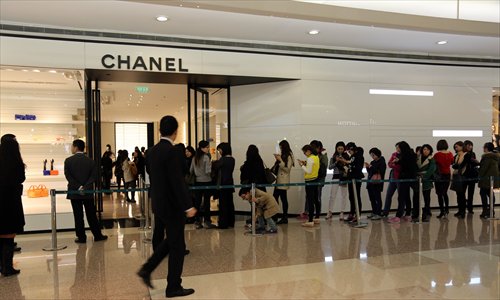HOME >> BUSINESS
Chanel cuts mainland prices
By Li Qiaoyi and Zhang Ye Source:Global Times Published: 2015-3-19 23:28:01
Move likely to curb gray market

People queue outside a Chanel store in Shanghai on Thursday. Photo: IC
Mainland shoppers have rushed to take advantage after French fashion house Chanel announced price cuts for some of its handbags in China, as part of the company's plan to harmonize its global pricing.
In a measure to "reduce price differentials across countries, which have widened considerably, further to the recent depreciation of the euro," Chanel has decided to harmonize the prices of three of its bags "on a worldwide level as of April 8," the company said in a statement e-mailed to the Global Times on Thursday.
"The domestic prices of three of Chanel's signature bags - the iconic 11.12 and 2.55 models as well as Boy Chanel bags - were slashed earlier this week," a saleswoman at a Chanel store in Beijing's Central Business District (CBD) told the Global Times on Thursday.
For instance, the price in the mainland for the medium-sized 2.55 bag is currently 33,200 yuan ($5,358.48), according to the saleswoman.
This represents a fall of nearly 22 percent from the previous price tag of 42,500 yuan.
The price cuts for the other two bags are also around 20 percent.
More than a dozen consumers were seen selecting products at the CBD Chanel store on Thursday afternoon, while the nearby Louis Vuitton, Gucci and Fendi stores were almost empty.
In Shanghai, buyers have been even more passionate about Chanel, which has long been one of the most sought-after luxury brands for mainland shoppers.
A Chanel store in the commercial hub of Nanjing West Road in Shanghai has been crowded with shoppers in recent days, with the three bags covered in the price adjustment nearly sold out, Shanghai-based news portal thepaper.cn reported on Thursday.
Chanel has not implemented the new price policy in Europe, Mu Zhe, who hails from North China's Shanxi Province and is now studying in France, told the Global Times on Thursday.
Mu has earned some extra money by working as an agent buying products overseas and reselling them to mainland shoppers. Such agents are increasingly common, and are known as daigou in Chinese.
Like many of its peers in the luxury sector, Chanel has charged higher prices in the Chinese mainland than in many other markets, which has discouraged mainland shoppers from buying locally and has also fueled a growing gray market.
A January report by US management consultancy Bain & Company said that in 2014, 70 percent of luxury goods bought by mainland consumers were purchased either during overseas travel or through daigou agencies.
The mainland's daigou market was worth 55-75 billion yuan in 2014, equivalent to nearly 50 percent of the store sales, the Bain report said.
Sales of luxury goods in the mainland fell for the first time in 2014, dropping 1 percent year-on-year to 115 billion yuan, according to the report.
In its statement e-mailed to the Global Times, Chanel said its new policy is also "intended to fight against parallel resale markets, which benefit from current price differentials and jeopardize the business, the image and the exclusivity" of the brand.
The policy will be extended across "all product lines of the Fashion collection prices in 2015," the statement said.
Price adjustments specific to different markets were not provided in the statement, but a Reuters article on Tuesday said that prices of the bags will increase in Europe, while falling in markets including the Chinese mainland, Hong Kong and South Korea. The prices will remain stable in markets such as Japan and the US, the report said.
Other luxury brands are likely to join the price harmonization trend, Zhou Ting, a luxury industry expert with Shanghai-based Fortune Character Institute, told the Global Times on Thursday, adding that people engaged in the daigou business would take a big hit.
Chanel's price cut will weaken rich buyers' motivation to buy bags themselves in Europe or from online individual sellers, said Zheng Yuan, a 29-year-old Beijing resident who used to resell Chanel bags she bought overseas to mainland consumers.
"The price differential between the EU and the mainland will be narrowed down to some 1,000 yuan after the cut, while it used to be over 10,000 yuan," Zheng told the Global Times Thursday.
Nonetheless, the daigou market will not disappear, as Chinese buyers will still need it to get limited editions that are offered only in the EU, said Mu.
However, people might continue to buy the bags from Hong Kong where they will still be cheaper, said Zhou.
By press time Thursday, a survey of 250 Web users by news portal fashion.sina.com.cn via its Weibo account found that only 7.6 percent of participants would continue to buy Chanel bags from the EU, while 10 percent would consider switching to other markets including Hong Kong and the US, and 26.4 percent would directly buy the products at stores in the mainland.
Posted in: Companies